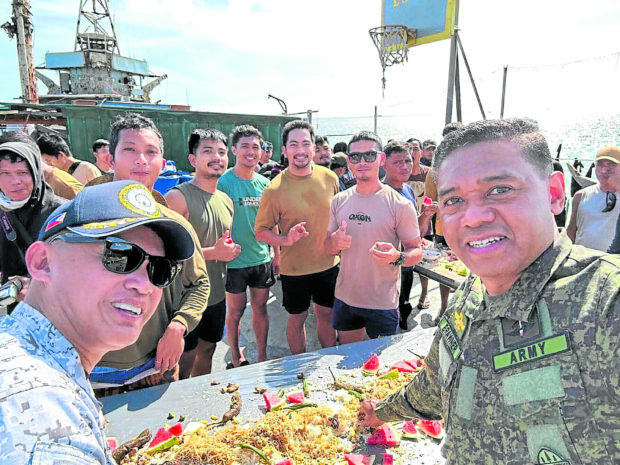China envoy summoned over ‘aggression’ in West Philippine Sea

SPECIAL GUEST | Armed Forces of the Philippines chief of staff Gen. Romeo Brawner Jr. joins troops stationed at BRP Sierra Madre in Ayungin (Second Thomas) Shoal for a meal on Sunday, Dec. 10, 2023. He conveyed President Ferdinand Marcos Jr.’s appreciation and Christmas greetings, boosting the soldiers’ morale. (Photo from the Public Affairs Office of the Armed Forces of the Philippines)
MANILA, Philippine — Chinese Ambassador to Manila Huang Xilian was summoned on Monday afternoon regarding the latest incidents of Chinese harassment in the West Philippine Sea (WPS), Department of Foreign Affairs (DFA) spokesperson Ma. Teresita Daza said at a press briefing in Malacañang.
“We note that this is the fourth time this year, with the two incidents happening just over the weekend that water cannons have been used against Philippines’ vessels. More alarmingly, this is the third incident where dangerous maneuvers by Chinese vessels have resulted in a collision since 2022 October in (a resupply) mission,” she said.
The DFA official added that the Philippine Embassy in Beijing made a diplomatic demarche, or a formal representation of the government’s position, to the Chinese Ministry of Foreign Affairs on Sunday.
The demarche included the harassment incidents in Bajo de Masinloc off Zambales on Saturday and in Ayungin (Second Thomas) Shoal on Sunday.
Daza said the DFA also lodged a protest on Sunday noon through the maritime communication mechanism, or the so-called hotline maintained between the DFA’s Office of Maritime and Ocean Affairs and the Chinese Foreign Ministry’s Department of Boundary and Ocean Affairs.
Article continues after this advertisementIn posts on his social media pages late Sunday night, President Marcos said the government would remain steadfast in defending the country’s sovereignty amid the latest aggressive and provocative moves of Chinese naval forces against Filipino troops in the West Philippine Sea.
Article continues after this advertisement“The aggression and provocations perpetrated by the China Coast Guard and their Chinese Maritime Militia against our vessels and personnel over the weekend have only further steeled our determination to defend and protect our nation’s sovereignty, sovereign rights, and jurisdiction in the West Philippine Sea,” he said.
“The illegal presence in our waters and dangerous actions against our citizens is an outright and blatant violation of international law and the rules-based international order,” Marcos added.
During Sunday’s incident, Armed Forces of the Philippines chief of staff Gen. Romeo Brawner Jr. witnessed for himself China Coast Guard’s harassment when he joined the resupply mission on board a Philippine Navy ship before transferring to the Unaizah May 1 supply boat.
Brawner paid a morale-boosting visit to a remote military outpost at the center of tensions between the Philippines and China to personally thank the troops there.
He was the first AFP chief to make such a trip to the dilapidated World War II-era warship, the BRP Sierra Madre since it was intentionally grounded by the Philippines in 1999 as part of its claim on Ayungin Shoal. He was accompanied by Western Command chief Vice Adm. Alberto Carlos.
“It was enraging. You can really feel the tensions,” he told the Inquirer, as he described what he had seen.
The Chinese coast guard also deployed two dinghies that chased their boat inside the shoal to keep an eye on them, he said.
National Security Council spokesperson Jonathan Malaya on Monday branded the China Coast Guard’s “illegal and aggressive” actions as a “serious escalation” that cast doubt on Beijing’s sincerity regarding its call for a peaceful dialogue.
As many as 46 vessels were in the vicinity of the shoal in Sunday’s resupply mission, more than the 38 ships in November and 15 in October.
Commodore Jay Tarriela, Philippine Coast Guard spokesperson for the West Philippine Sea, said the 46 Chinese vessels — 14 Chinese maritime militia in the vicinity and another 22 within the automatic identification system, eight China Coast Guard ships, and two Chinese Navy vessels — were “the largest number of maritime forces that we have documented so far in the previous months.”
Malaya said the task force was set to present to President Marcos a new national strategy that will address China’s activities in the West Philippine Sea.
Extreme option
On mounting calls to declare Huang as persona non grata, Daza said it was something that had to be “seriously considered” if the West Philippine Sea incidents merited having him expelled.
“When an ambassador assumes, he is accepted by the accrediting host government. If you do something or say something that is unwelcome, then you can be subject to what they call persona non grata (status),” Daza said, without naming Huang.
Daza clarified, however, that declaring the ambassador as persona non grata would be an “extreme” diplomatic option.
“As I also want to express, [declaring a diplomat] persona non grata—when you do that—that is at a certain level already and there are both intended and unintended consequences, and that is the reason why a serious consideration should actually be undertaken,” she noted.
Meanwhile, Daza said 14 countries had expressed their support for the Philippines against China’s illegal activities in Philippine waters.
These included Australia, Canada, Denmark, the European Union, Finland, France, Germany, Ireland, Japan, Republic of Korea, the Netherlands, New Zealand, the United Kingdom and the United States.
Also on Monday, the US Department of State branded the latest water cannon attacks as a “reckless disregard” for international law and the Filipinos’ safety and livelihoods.
—WITH A REPORT FROM TINA G. SANTOS
For comprehensive coverage, in-depth analysis, visit our special page for West Philippine Sea updates. Stay informed with articles, videos, and expert opinions.